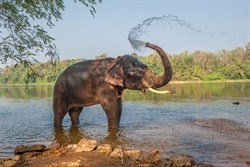
Top stories


Marketing & MediaAI changed how I work as a designer, faster than I expected
Emmanuel Naidoo, Ignition Group 4 hours




More news









ESG & Sustainability
Can Ramaphosa’s crisis committee solve South Africa’s water woes?



















On Monday, 23 March, the African Elephant Summit will gather delegates to discuss and review progress on measures agreed in December 2013 intended to alleviate the poaching of elephants in the wild, driven by global demand for ivory.
This will be followed by an international conference on Illegal Wildlife Trade on Wednesday, 25 March, which will review the progress made by the 41 signatories to the London Declaration of 2014 which acknowledged the scale of illegal wildlife trade and recognised that poaching and trafficking of wildlife undermined the law and was linked to corruption and organised crime, and how they intended to end it.
"Poaching of wildlife and illegal wildlife trade has reached the point of crisis, so it's essential that governments are willing to critically examine and discuss how successful they have been in living up to the commitments they have made to safeguard wildlife," said Jason Bell, director of the IFAW Elephant Programme.
"In the past 15 months dozens of governments have promised to act against the entire trade chain - range, transit and consumer nations. The Kasane summits cannot be another session in which world leaders sit and talk about a problem - we need to see if their efforts are bearing fruit in the fight against poaching and illegal trade, and for them to decide on meaningful next steps."
The number of poached rhinos has soared in the past year, with South Africa losing a record 1,215 rhino in 2014 - a 21% increase over 2013, while elephants around the world continue to be slaughtered in their tens of thousands to feed the illegal ivory trade.
"On a more positive note, estimated tiger numbers in India have increased by nearly a third in the past three years, from 1,706 in 2011 to 2,226 in 2014," said Bell. "This shows that conservation measures coupled with commitment to law enforcement can have an impact for saving species at risk."
As one of the world's most lucrative criminal activities, valued at $19bn annually, illegal wildlife trade ranks among damaging and dangerous global crimes such as trafficking in drugs, people, oil and counterfeiting.